Welcoming a dog into your home brings immense joy, but also a significant responsibility, especially when it comes to their diet. Human foods can be a delightful treat or, alarmingly, a grave danger for our canine companions. While many dog owners are aware of common toxic foods like chocolate, the specific dangers posed by certain meats are often less understood. Unfortunately, some of the most common household meats can make your dog very ill, with some being toxic even in small amounts. This guide explores the specific question of what is the one meat that dogs should never eat and provides a comprehensive overview of other high-risk foods to help keep your furry friend safe and healthy.
Pet poisonings are a serious threat, with hundreds of thousands reported annually in the United States alone. While not all of these incidents are food-related, common household foods, including certain types of meat, are major contributors. Understanding what your dog can and cannot eat is your “cheat sheet” to preventing potentially life-threatening situations and ensuring your dog thrives on a safe and balanced diet.
Understanding Canine Digestion: Why Some Foods Are Toxic
The fundamental difference between human and canine digestion and metabolism explains why many foods that are safe for us can be harmful, or even fatal, to dogs. A dog’s body processes certain substances very differently, leading to varied reactions to specific ingredients.
For example, dogs metabolize compounds like theobromine and caffeine, found in chocolate, much slower than humans. This means these substances can build up rapidly in their system, leading to severe illness or even death. Similarly, while you might enjoy cherries, the cyanide in their pits, stems, and leaves can be problematic for dogs if ingested in large quantities. Additionally, fruit pits, regardless of cyanide content, can cause gastrointestinal obstruction and diarrhea because they are hard for dogs to digest.
It’s also important to remember that food toxicity isn’t a one-size-fits-all issue. A dog’s size, breed, and existing health conditions can significantly influence how they react to a toxic substance. What might cause mild discomfort in a large, healthy dog could be fatal for a small puppy or a dog with a pre-existing liver condition. This variability underscores the critical importance of consulting your veterinarian if you ever have questions or concerns about what your dog consumes. Their expert guidance is invaluable in navigating the complexities of canine nutrition and safety.
The Absolute “Never Eat” List: Focusing on Meats and Other High-Risk Foods
When it comes to the question of “What Is The One Meat Dogs Should Never Eat,” the answer isn’t a single type of meat but rather specific preparations or parts of meat that pose significant risks. While lean, cooked meats like plain chicken or turkey (without skin or bones) can be healthy treats in moderation, many common meat items found in human diets are incredibly dangerous.
Fatty Cuts of Meat (Chicken/Turkey Skin, Ham, Bacon): The Pancreatitis Threat
One of the most dangerous categories of meat for dogs is fatty cuts, including chicken skin, turkey skin, ham, bacon, and other high-fat trimmings. These items, often considered delicious scraps by humans, are detrimental to your dog’s health due to their high-fat content. Ingesting fatty foods can trigger acute pancreatitis, a severe inflammation of the pancreas that is excruciatingly painful and can be life-threatening. The pancreas plays a crucial role in digestion, and when inflamed, it can lead to complications such as organ damage, infection, and even death. It’s always safer to dispose of these fatty scraps rather than offering them as a treat. Understanding what ingredients should dogs not eat is vital for preventing such incidents, and high-fat meats are at the top of that list.
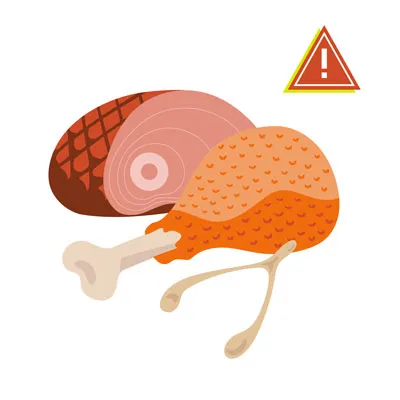 Slices of various fatty meats, including ham, chicken and turkey skin, which are dangerous for dogs
Slices of various fatty meats, including ham, chicken and turkey skin, which are dangerous for dogs
Raw or Undercooked Meat: The Risk of Bacteria and Bones
Another type of meat dogs should definitively never eat is raw or undercooked meat. While some proponents advocate for raw diets, the risks associated with raw meat far outweigh any perceived benefits for the average pet owner. Raw meat can harbor dangerous bacteria such as Salmonella and E. coli, which can cause severe gastrointestinal illness in dogs, just as they do in humans. Symptoms can range from vomiting and diarrhea to more severe infections requiring intensive veterinary care.
Furthermore, raw meat often contains bones, which present a dual threat. Bones, whether raw or cooked, can splinter, causing internal injuries to the mouth, throat, stomach, or intestines. These splinters can lead to obstructions, perforations, and potentially fatal abdominal infections. Even if the bones don’t splinter, they can still cause choking or become lodged in the digestive tract, necessitating emergency surgery. Therefore, for the safety of your dog, all meat should be thoroughly cooked and deboned before being offered as a treat.
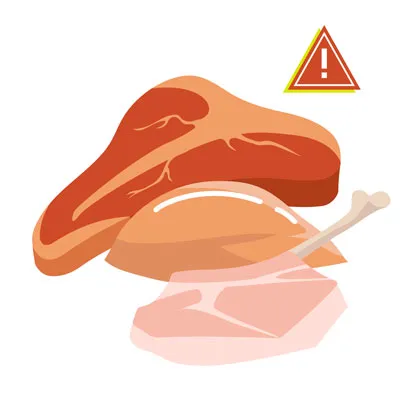 Raw ground meat, illustrating the bacterial and choking hazards associated with uncooked food for dogs
Raw ground meat, illustrating the bacterial and choking hazards associated with uncooked food for dogs
Cooked Bones (Chicken, Turkey): A Silent Danger
While raw bones pose risks, cooked bones are equally, if not more, dangerous. The cooking process makes bones brittle and prone to splintering into sharp fragments. These fragments can cause severe damage internally, leading to cuts in the esophagus, stomach, or intestines, or causing blockages that require immediate veterinary intervention. Even small cooked bones from chicken or turkey can be hazardous. It is a common misconception that cooked bones are safe, but in reality, they are a significant choking and internal injury hazard that should always be avoided.
Processed Meats and High-Sodium Foods (e.g., Ham, Salty Snacks): Beyond Just Fat
Beyond the fat content, processed meats like ham, sausages, and other cured meats often contain excessive amounts of salt and other additives. High sodium intake can lead to a condition called sodium ion poisoning in dogs, which can cause symptoms such as extreme thirst, frequent urination, vomiting, diarrhea, tremors, seizures, and in severe cases, coma or death. The added spices and preservatives in processed meats can also be irritating or toxic to your dog’s digestive system.
Other Critical Foods Dogs Must Avoid (Non-Meat but Highly Toxic)
While the focus here is on meat, it’s crucial to acknowledge other household foods that are highly toxic to dogs and should be avoided at all costs. These can often be found in the same environments as meat and present equally severe risks.
- Chocolate: This is perhaps the most well-known toxic food for dogs. It contains theobromine and caffeine, which dogs cannot metabolize efficiently. Darker chocolates have higher concentrations of theobromine, making them more dangerous. Ingestion can lead to hyperactivity, vomiting, diarrhea, abnormal heart rhythms, and seizures.
- Grapes and Raisins: These innocent-looking fruits can cause acute kidney failure in dogs. The exact toxic mechanism is still not fully understood, but even small amounts can be dangerous. Symptoms include vomiting, diarrhea, lethargy, and a decrease in urine output.
- Xylitol: This artificial sweetener is found in many sugar-free products like gum, candy, peanut butter, and baked goods. In dogs, xylitol causes a rapid and severe drop in blood sugar (hypoglycemia), leading to weakness, seizures, and potentially liver failure. It is extremely toxic, and even a small amount can be fatal for a dog.
- Onions, Garlic, Chives, and Leeks: These members of the Allium family contain compounds that can damage a dog’s red blood cells, leading to anemia. Garlic is generally more potent than onions. Symptoms may include lethargy, weakness, pale gums, and increased respiratory rate.
- Alcohol: Even small amounts of alcohol can be toxic to dogs, leading to symptoms similar to human alcohol poisoning: vomiting, disorientation, breathing problems, coma, and even death. Their smaller size makes them far more susceptible to its effects.
- Avocado: While the fleshy part might not be highly toxic to all dogs, it contains persin, which can cause vomiting and diarrhea in some animals. More significantly, the large pit poses a severe choking hazard and can cause gastrointestinal obstruction.
- Macadamia Nuts: These nuts can cause weakness, overheating, vomiting, and tremors in dogs. The exact mechanism of toxicity is unknown, but as few as six nuts can cause severe poisoning in a small dog.
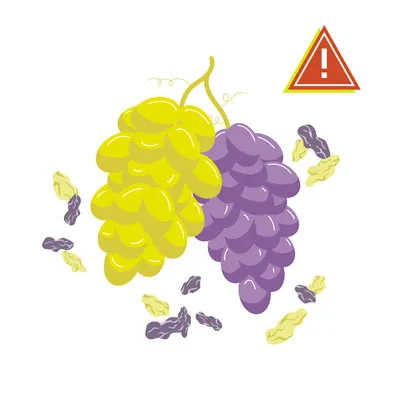 A collection of grapes and raisins, highlighting fruits that can cause severe kidney failure in dogs
A collection of grapes and raisins, highlighting fruits that can cause severe kidney failure in dogs
While focusing on meat, it’s crucial to consult a broader what dogs can t eat list to ensure comprehensive safety.
Less Obvious Dangers and Foods to Exercise Caution With
Beyond the highly toxic items, many other foods require caution or should be avoided due to specific components or potential side effects.
- Fruit Seeds/Pits (Apple, Apricot, Cherry, Plum): The fleshy parts of these fruits can be safe, but the seeds and pits contain cyanide, which is toxic. The pits also pose a choking hazard or can cause intestinal blockages.
- Broccoli: In very large doses, broccoli contains isothiocyanates which can be harmful. Small amounts are generally okay, but there are many healthier and safer vegetable options. The stalks can also be a choking hazard.
- Caffeine and Coffee Grounds: Similar to chocolate, caffeine contains methylxanthines that can cause fatal diarrhea, vomiting, seizures, and an irregular heartbeat. Coffee grounds, tea bags, and energy drinks are all dangerous.
- Mushrooms: While grocery store varieties might be safe, it’s best to avoid all mushrooms unless you are absolutely certain of their safety, as wild mushrooms can contain a variety of toxins causing liver/kidney failure, hallucinations, and other severe issues.
- Nutmeg and Cinnamon: Nutmeg contains myristicin, which can cause hallucinations and severe vomiting, especially in small dogs or in high doses. Cinnamon isn’t toxic but can irritate a dog’s mouth and, in powdered form, can be inhaled, causing breathing problems. Large amounts may also lead to low blood sugar.
- Spicy Food: Hot, spicy foods can cause severe gastrointestinal upset, including vomiting, diarrhea, and stomach ulcers, leading to pain and potentially an emergency vet visit.
- Tomatoes (Green parts, Unripe) and Raw Potatoes: Ripe red tomatoes are generally safe, but the green parts of the plant and unripe tomatoes contain solanine, which is toxic. Similarly, raw potatoes contain solanine; potatoes should always be cooked and plain.
- Tobacco: Nicotine-containing products are highly toxic, causing vomiting, diarrhea, agitation, abnormal heart rates, seizures, and potentially coma or death. Immediate veterinary attention is required if ingested.
- Yeast and Raw Dough: Raw dough can expand in a dog’s stomach, causing severe pain, bloating, and potentially life-threatening torsion or rupture. The yeast and sugar also ferment, producing alcohol, leading to alcohol toxicity.
- Rhubarb and Star Fruit: Both contain soluble calcium oxalate crystals, which can bind with calcium in the body, causing a dangerous drop in calcium levels and potentially leading to renal failure. Symptoms include tremors, weakness, and bloody urine.
- Flavored Water and Seltzer Water: It’s always best to offer plain, fresh water. Flavored or carbonated waters can contain added sugars, salts, or artificial sweeteners (like xylitol), making them dangerous. Plain seltzer water might cause gas and bloating.
This comprehensive overview covers many what foods should never be given to dogs beyond just meat.
Safer Alternatives: What Your Dog Can Enjoy
While the list of foods to avoid is extensive, there are plenty of safe and healthy human foods that your dog can enjoy as occasional treats. These can be excellent alternatives to potentially dangerous items and contribute to your dog’s overall nutrition.
- Lean, Cooked Meats: Plain, thoroughly cooked, boneless, skinless chicken, turkey, and lean beef (without any seasoning or high-fat trimmings) can be excellent sources of protein. Offer in small, bite-sized pieces.
- Fruits: Apples (without core/seeds), bananas (peeled), blueberries, blackberries, cantaloupe, mangoes (peeled, pitted), peaches (pitted), pears (cored), pineapples (peeled, cored), and watermelon (seedless, rind removed) are all safe in moderation.
- Vegetables: Carrots, green beans, cucumbers, celery, cooked sweet potatoes, and pumpkin (plain, canned) are great low-calorie, nutrient-rich options.
- Eggs: Fully cooked, plain eggs (scrambled or hard-boiled) are a fantastic source of protein and can soothe an upset stomach.
- Peanut Butter (Xylitol-Free): In moderation, unsalted, unsweetened, and most importantly, xylitol-free peanut butter can be a high-protein treat. Always check the label for xylitol.
- Cheese: Small amounts of low-fat cheese can be okay for dogs that are not lactose intolerant.
- Plain Popcorn/Corn: Air-popped, unsalted, unbuttered popcorn or corn (off the cob) can be a fun treat.
- Coconut (in moderation): Small amounts of coconut flesh, milk, or oil are generally fine, but avoid coconut water and the furry shell.
- Fish: Plain, fully cooked, boneless fish like salmon or sardines can be given in moderation (no more than twice a week) as a source of omega-3s.
- Shrimp: Plain, fully cooked, shelled shrimp can be a good protein treat.
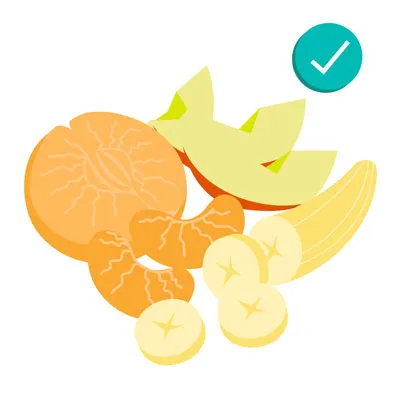 A bowl filled with fresh apples, oranges, and bananas, representing safe and healthy fruit treats for dogs
A bowl filled with fresh apples, oranges, and bananas, representing safe and healthy fruit treats for dogs
Dogs Most at Risk: Understanding Vulnerability
While all dogs are vulnerable to toxic foods, certain factors can increase their risk and the severity of their reaction. Understanding these vulnerabilities can help pet owners be even more cautious.
- Small Breeds vs. Large Breeds: Smaller dogs are generally more susceptible to toxins due to their lower body weight. A small amount of a toxic substance, like chocolate or xylitol, will have a much higher concentration in a small dog’s system compared to a large dog, leading to more severe symptoms or a fatal outcome.
- Puppies: Young dogs have less developed digestive and immune systems, making them more vulnerable to foodborne pathogens (like those found in raw meat) and less able to process toxins effectively. Their curious nature also makes them more likely to ingest something they shouldn’t.
- Elderly Dogs: Older dogs may have compromised immune systems, slower metabolisms, or underlying health conditions that make them more sensitive to harmful foods. For instance, a senior dog with kidney disease would be at much higher risk from grape or raisin toxicity.
- Dogs with Pre-existing Conditions: Dogs suffering from conditions like diabetes, kidney disease, liver disease, or pancreatitis are at significantly greater risk from foods that can exacerbate these conditions or introduce new complications. Their bodies may already be struggling, making them less resilient to dietary challenges.
Proactive Prevention: Keeping Your Dog Safe
Accidents happen, but proactive measures can drastically reduce the risk of your beloved pup ingesting unsafe human food. Vigilance and education are your best tools.
1. Store Foods Out of Reach
The simplest and most effective prevention method is to ensure that all potentially toxic foods are stored securely and out of your dog’s reach. This means keeping dangerous items on high shelves, in locked pantries, or in cabinets that your dog cannot open. Never leave toxic foods on countertops or low tables where a curious dog might easily access them. This also applies to garbage cans; use ones with secure lids or keep them in inaccessible areas.
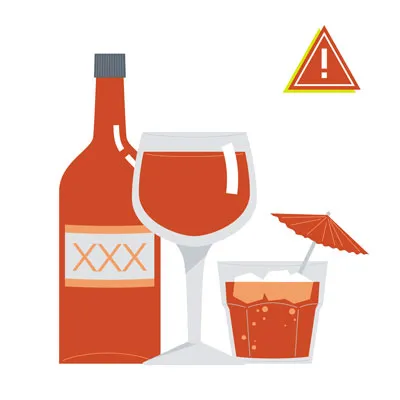 A glass of beer and other alcoholic drinks, representing substances highly toxic to dogs
A glass of beer and other alcoholic drinks, representing substances highly toxic to dogs
2. Avoid Feeding Dogs from Your Plate
It can be tempting to share a bite of your meal with your dog, especially when they give you those adorable puppy-dog eyes. However, creating a habit of feeding from your plate can lead to begging, and more dangerously, can accustom your dog to eating human food, making them more likely to steal food when unsupervised. It’s safest to only give your dog treats that are specifically formulated for canines.
3. Educate Family Members and Guests
Ensure everyone in your household, including children, and any guests who visit, are aware of the foods your dog cannot eat. Clearly communicate that no human food, regardless of how small the amount or how tempting it seems, should be sneaked to your dog. Many poisoning incidents occur because a well-meaning but uninformed family member or guest offers a dangerous treat.
4. Be Careful During Holidays and Gatherings
Holidays and social gatherings often involve an abundance of food and a more relaxed atmosphere, making it easy to let your guard down. Be extra cautious during these times. Keep food off tables and counters, dispose of scraps immediately in secure bins, and remind guests about your dog’s dietary restrictions. Having a designated safe space for your dog, or even temporarily crating them during meal times, can provide an extra layer of protection.
If, despite your best precautions, your dog consumes something toxic, being prepared for an emergency is vital. Keep contact information for your veterinarian and a 24/7 emergency veterinary clinic readily accessible.
What to Do if Your Dog Consumes Something Toxic
If you suspect or know that your dog has eaten something toxic, acting quickly is crucial. The sooner medical intervention begins, the better the prognosis.
First, familiarize yourself with the common symptoms of food toxicity, which can vary widely depending on the substance ingested. These may include:
- Vomiting (sometimes bloody)
- Diarrhea (sometimes bloody)
- Lethargy or weakness
- Distress or restlessness
- Pain (e.g., abdominal pain)
- Excessive drooling
- Tremors or seizures
- Increased thirst or urination (or lack of urination)
- Abnormal heart rate or breathing
- Bloating or a hard stomach (can indicate a severe issue like gastric dilatation-volvulus or extreme gas)
If you observe any of these symptoms or know your dog has ingested a dangerous food, take the following steps immediately:
- Call Your Veterinarian or a Pet Poison Control Center Right Away: Do not wait for symptoms to worsen. Timing is critical for successful treatment. Have the phone numbers saved in your contacts.
- Be Ready with Information: When you call, be prepared to provide as much detail as possible:
- The type of food eaten.
- The approximate amount consumed.
- The time of ingestion.
- Your dog’s breed, age, and weight.
- Any symptoms your dog is currently exhibiting.
- If possible, have the packaging of the ingested item on hand for ingredient lists.
- Avoid Home Remedies Unless Instructed: Do not attempt to induce vomiting or administer any home remedies (like activated charcoal) unless explicitly advised to do so by a veterinarian or poison control expert. Some toxins can cause more harm if vomiting is induced, and some remedies can be inappropriate or dangerous depending on the specific substance ingested.
Ultimately, knowing what dog can eat and can t eat empowers you to make the best dietary choices for your pet.
Conclusion
Navigating the world of human foods and their potential impact on your dog’s health can seem daunting, but with the right knowledge, you can significantly reduce risks. While there isn’t just “one meat” that dogs should never eat, the most dangerous meat-related items include fatty cuts like chicken skin and ham, raw or undercooked meats, and any cooked bones. These pose serious threats ranging from pancreatitis and bacterial infections to choking and internal injuries.
Beyond meats, other highly toxic foods such as chocolate, grapes, raisins, xylitol, onions, and garlic demand absolute vigilance. By understanding the unique way dogs metabolize these substances, and by implementing proactive prevention strategies like secure food storage and educating family members, you can safeguard your dog from potential harm.
The good news is that many healthy and safe human foods can be shared as occasional treats, offering variety and enjoyment for your canine companion. Always err on the side of caution: if you are ever unsure about a food, consult your veterinarian. Their expertise is invaluable in ensuring your dog receives the best possible care and enjoys a long, healthy life free from preventable food-related incidents. Consider investing in pet insurance, which can provide peace of mind and financial support for unexpected situations, including those related to accidental ingestion of toxic foods.
References: Information presented in this article is based on veterinary consensus and insights from reputable sources such as the American Kennel Club (AKC), American Society for the Prevention of Cruelty to Animals (ASPCA), PetMD, WebMD, Colorado State University, VCA Animal Hospitals, and the Merck Veterinary Manual.
